With this unthemed issue and its impressive international scope, JSE enters its sixth year and shows its stretch across the continents.
Continue Reading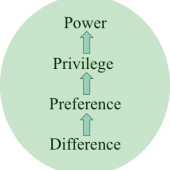
This paper explores the intrinsic but often weakly developed links between sustainability and issues of diversity, power, and privilege. It offers a systems-oriented conceptual framework for exploring and understanding how issues of diversity, power and privilege operate in social-ecological systems. This framework can be used as a learning tool with a wide array of audiences (higher education, organizational development, adult learners) and educational contexts (including but not limited to sustainability education programming).
Continue ReadingThe “Whole Earth Catalog” (1968-1972) featured a collection of creative ideas, articles, and durable, practical tools promoted from a utilitarian, environmentally conscious, and intellectual perspective. The wisdom inherent in the catalog may be of value to education today, as we seek innovative, timeless, and empowering technologies to promote sustained learning for all. This purpose of this article is to position the discussion of sustainable educational technology tools for 21st Century education within the context of the “Whole Earth” standards: 1) High quality at a reasonable cost, 2) Easily accessible, 3) Useful and relevant to independent or self education, and 4) Capable of launching a cascade of new opportunities.
Continue ReadingUndergraduate education majors were enrolled in a project based learning methods course in spring 2012. As a culmination, they prepared five year plans to promote environmental stewardship in primary public schools in Bahrain. Since all students plan to eventually teach science in the primary schools, it is hoped they will be able to implement at least some of their plan and foster environmentally friendly habits that last for the lifetime of their students.
Continue ReadingThe United States along with many other nations actively support the United Nations agenda to educate the next generation about sustainability. Library and information science (LIS) educators may support this effort by incorporating sustainability concepts into the LIS curriculum. While multiple alternatives exist for this goal, this paper argues and provides ideas integrating sustainability into a course focusing on management, offered, and frequently required, by most American Library Association accredited LIS programs. Discussion explains the meaning of sustainability; the international agenda surrounding it; why LIS programs need to help further the sustainability agenda; and, alternatives for incorporating sustainability into the LIS curriculum.
Continue ReadingThis article explores the relation between politics and sustainability education. It draws upon a political ecology of education perspective to analyze how political and economic processes shape the curricular content of sustainability education, environmental behaviors, and processes of ecological change in Brazil. Examples from research on agroecological education within the Brazilian Landless Workers’ Movement (MST) highlight how national level public policies and economic incentives intersect with the MST’s political ideology to influence the creation of sustainability education programs, development of curricular content, and advocacy around land management practices. Scholars, educators, administrators, and community activists are encouraged to draw upon the political ecology of education perspective in negotiating the political nature of sustainability education.
Continue ReadingFull PDF: Gardner JSE Vol 7 Dec 2014 Abstract: Finding out what students enjoy most, and designing a teaching curriculum to include those enjoyable activities, is the key to motivation and learning in a nontraditional educational environment. At the Maryland Correctional Institution in Jessup, ESL students love art expression in any form, thus, the instructor […]
Continue ReadingIntroductory urban planning courses provide an effective platform for delivering education for sustainable development (ESD) competencies. As general education courses, they constitute a unique niche for conveying sustainability concepts, theories, and applications to undergraduates. Learning outcomes include new skill sets, such as transdisciplinarity. One vexing question, however, is how to ascertain if ESD is actually being delivered. This paper suggests that instructors can answer this question by building an understanding of their classrooms, students, and objectives over time using simple techniques. We illustrate our course design considerations and our attempts to gain insight by inspecting class assignments and student survey data. We hope to engage readers in a conversation that develops an outcomes assessment paradigm which recognizes the oftentimes hard-to-quantify nature of affective learning outcomes inherent to ESD, and embraces the values of exploration, diversity, and emergence intrinsic to sustainability.
Continue ReadingThe dawning anthropocene requires innovation and organizational change across all types of institutions, including in higher education. One area where innovation can occur is in curricula building, and the offering of pertinent classes for sustainability education. This paper approaches sustainability education within the classroom from the perspective of the environmental humanities, focusing especially on the discipline of religion and nature/ecology. Scholarly tools from these domains provide teaching and research opportunities to help build on-campus and campus-community sustainability networks and initiatives. Three readings are analyzed to explore how teaching about sustainability via the environmental humanities is an integral part of campus sustainability initiatives, both in the classroom, in the community, and with facilities. The readings are international in scope and focus on water resource management. It is argued that exposing students to how different cultures conceive of and thus manage the natural world, and specifically fresh water, presents an opportunity for critical reflection and such reflection can help generate best teaching practices for sustainability education. Furthermore, teaching about sustainability via the environmental humanities can allow for interdisciplinary networks to be forged, thus helping higher educational institutions realize their mission and value statements.
Continue Reading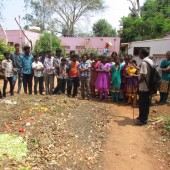
India is challenged by the nexus of environmental degradation and economic growth amidst the paradoxical coexistence of poverty and affluence in their multifarious dimensions. These challenges are directly linked with the conservation and maintenance of the life supporting systems such as land, water, air, and biological diversity. The major causes of environmental degradation are population growth, industrialisation, changes in consumption patterns, and poverty threatening the dynamic equilibrium that could exist between people and ecosystems. In an effort to address these issues, environmental education for sustainable development (EESD) is emerging as an important approach to encourage students to conserve and protect the natural environment in their schools and in their neighbourhoods.
Continue ReadingThe purpose of this article is to articulate the significance of education for sustainable development in order to support the integration of sustainability as a cross-curricular priority within the newly developed Australian Curriculum. An investigation into the implementation of sustainability across the curriculum was carried out in two Australian public schools in order to identify its relevancy to various learning areas. The developmental history of the Australian Curriculum will be explored to contextualize this article within the current socio-political environment. Discussions with teachers suggested that the political agendas surrounding the curriculum had influenced the implementation of sustainability in different learning areas. The school located in the Labor electorate had demonstrated their ability to implement sustainability in all six learning areas investigated. Results from the school located within the Liberal electorate showed that sustainability was less of a priority with the implementation of three out of the six learning areas teaching sustainability organizing ideas to students. Semi-structured interviews were conducted with the head of curriculum of both schools and their perception of the environment was determined using Sauvè’s (1992, 1994) typology of conceptions for the environment. Focus group discussions with year seven and ten students had identified conceptions similar to that of their head of curriculum. Students identified environmental issues in their discussions and suggested education, as a means for combating climate change. Students expressed that sustainability was important and did so with concerns for the future.
Continue Reading
When the Department of Geography at the University of Oklahoma expanded its undergraduate degree options to include Environmental Sustainability in 2011, it was faced with the question of how should the Life-Cycle Assessment (LCA) core course be taught, and what aspects of LCA should it cover. In addition to the textbook selected for the classroom, it was clear that students would also need to get hands-on experience using LCA in a manner that reinforced and extended the themes taught in class. This dual challenge was resolved with the selection of a readable and easily understood text and the adoption of Sustainable Minds software for the conduct of student projects. In this paper, we describe the manner in which LCA is taught in the classroom and the important role that LCA software has played to help students acquire a working understanding of the merits of the technique as well as its limitations. Examples of student projects that were completed as course assignments are used to illustrate the scope of student interests and accomplishments.
Continue Reading
Social sciences in higher education, including fiber, textile and clothing (FTC) programs, have been slow to integrate sustainability, impeded by limited understanding about what to integrate. The objective of this study was to identify the dominant knowledge and skill areas included in educational programs that evidence high commitment to sustainability education. Qualitative analysis of secondary data revealed fifteen knowledge areas and eight skills in formal curriculum and seventeen topics commonly covered via informal education. This analysis identified natural and physical science knowledge most emphasized in sustainability learning but also revealed the importance of knowledge regarding economic and social issues. The most emphasized skill areas were problem solving, planning and management, and civic engagement. When comparing formal and informal programming there were many commonalities, yet the latter emphasized practical application to daily living. The study utilized the FTC discipline to illustrate how this framework of essentials may be useful as other social sciences reframe curriculum.
Continue Reading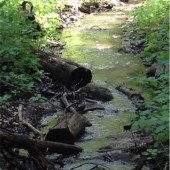
This study explores the overall health of the ecosystem at Glen Stewart Ravine in Toronto by the caring high school teenagers. Care for their ecological habitat reminds one of an ancient First Nation’s proverb: ‘We do not inherit the Earth from our ancestors but borrow it from our children’. These high school girls were exploring their neighbourhood environment to exhibit social care and joy for the love of student- motivated Scientific Investigative Project -SIP (Ayyavoo, 2013).
Teenage school girls from the inner city care about their immediate environment and acknowledge the interconnectedness of flora and fauna (including plants, animal and humans). The ‘hands-on and minds-on’ challenge inspires students to observe and study their natural habitat in depth to show care to sustain their neighbourhood ecosystem. The adage, ‘we borrow it from our children’, inspires these high school girls to use their scientific strategies to collect a series of biological and chemical test data from their environment. The biological test involved sifting a large net through the running ravine water to classifying the collected macroinvertebrates, while the chemical tests involved measuring the pH level of the ravine in addition to its turbidity levels, oxygen levels, and temperature. The data analysis depicts the health of the ravine, for the moment, at a passable grade. However, in order to maintain this positive state, Glen Stewart Ravine needs to be frequently monitored as new shops and businesses sprout in the nearby surrounding area. The findings of this study may be useful in providing more public awareness on environmental sustainability, care and a community oneness to preserve the ecosystem for the future generation.
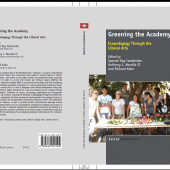
The authors review the book “Greening the Academy: Ecopedagogy through the Liberal Arts”, by Samuel Day Fassbinder, Anthony J. Nocella II and Richard Kahn, from the point of view of Environmental Education, as well as from that of Education for Environmental and Ecological Justice. The review focuses on the importance of the book for tertiary (university level) educational fields. It tries to study the parts of the book within the framework of two major axes transecting all similar – environmental or ecological or justice – educational and research fields: the axis of “old vs. new” and the axis of “local vs. global”.
Continue Reading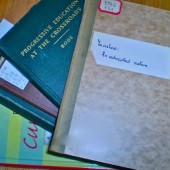
This conceptual article examines how teaching and learning has changed and continues to change as a result of the increase in cultural diversity in post-secondary classrooms. It focuses on how students’ and instructors’ culture and traditions impact the teaching and learning experience in culturally diverse post-secondary settings. Providing evidence from theoretical perspectives, this review assesses the need for and the potentially transformative nature of education that is sustainable.
English may be the lingua franca on North American university campuses, as well as on many campuses around the world, but since students and instructors come from many different backgrounds, just because English is the predominant language does not necessarily mean that education based on Western principles is the only way to do education. International students and instructors come from countries where education may be conducted differently and since the North American university system requires learning to be demonstrated in certain ways, it puts students that come from different systems at a disadvantage. Therefore it would seem that North American universities could benefit from the tenets of culturally sensitive teaching that Gay (2000) suggests as comprehensive, multidimensional, empowering, transforming, and emancipatory.
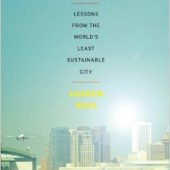
Andrew Ross’s Bird on Fire: Lessons from the World’s Least Sustainable City outlines the past, present, and future of development for the Phoenix area. He succinctly and compellingly argues that it is not only urban sprawl or rising levels of pollution that render this city unsustainable, but political and business agendas, the commitment to growth, and hostility towards immigrants all contribute to the challenges of maintaining Phoenix.
Continue Reading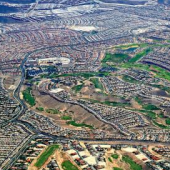
Like sprawl itself, writing about sprawl is scattered in a vast multidisciplinary literature. In this paper we provide a map of what is increasingly known about urban sprawl in emerging literature. This review of progress includes four main parts—definition, data, methods of measurement, and environmental consequences of urban sprawl. The focus of this literature review is to determine whether the aforementioned parts are elements of a connected system in which progress in any one part reflects in others, thereby enhancing knowledge of urban sprawl’s environmental consequences through a cross-fertilization with progress in how sprawl is defined, data are used, and phenomena are measured. We conclude with a discussion of areas of further research that surmounts the shortcomings of a disconnected, epistemic (knowledge) system of definitions, data, and methods, and points toward an explanation of urban sprawl’s environmental consequences. The implications for the education of urban sustainability are noted.
Continue ReadingFull PDF: Obermille & Atwood JSE Vol 7 Dec 2014 Abstract: The importance of teaching sustainability literacy is readily accepted, but relatively little attention has been paid to the adequacy or preparation of faculty to accomplish this task. At Seattle University, samples of incoming students, staff and faculty completed SUSTLIT, a survey of sustainability literacy. […]
Continue ReadingThough many post-secondary institutions are moving to incorporate sustainability education into their courses and programs, some faculty have not felt able or comfortable in this endeavor. Part of this may be rooted in the fact that a quantifiable definition of sustainability that is accessible across disciplines is largely absent in the literature. This work reviews a multitude of definitions of sustainability and frameworks for sustainability across multiple disciplines and synthesizes them into the cohesive Quantifiable Definition of Sustainability. The Quantifiable Definition of Sustainability seeks to eliminate barriers faculty across all disciplines may face to meaningful engagement with sustainability education.
Continue Reading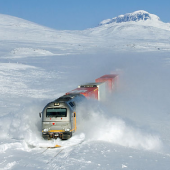
Popular fictional films can support sustainability education by bringing sustainability scenarios to life and appealing to wide audiences. One such film is Snowpiercer, a new film set in the aftermath of an environmental catastrophe. In this review, I cover a variety of themes in the film, discussing how they can be used for sustainability education. The themes include the geoengineering catastrophe that serves as the film’s backdrop and the survivor’s struggles to manage their limited resources. As a warning to the reader, the review also gives away the film’s plot.
Continue Reading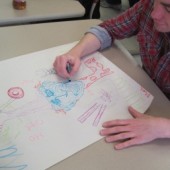
A personal reflection, from the professors’ perspective, of an arts integrated learning tool created to teach systems concepts in college level environmental studies and sustainability courses.
Continue Reading